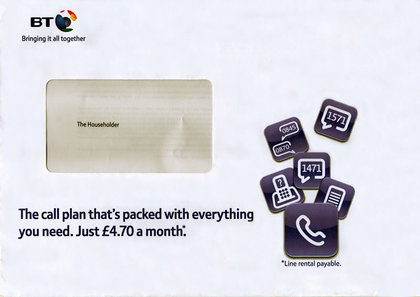
Here's a scenario… You're a BT customer and every couple of weeks your postman pushes one of these unaddressed 'To the Householder' letters through your door. As an existing customer the adverts are completely irrelevant. And anyway, you got a 'No Junk Mail' sign on your door.
The solution is to register with Royal Mail's Door-to-Door Opt-Out. As you might know, Royal Mail set up this opt-out scheme to make reducing unaddressed / unsolicited leaflets needlessly difficult. Respecting 'No Junk Mail' signs would be an easy and effective solution to the junk mail problem, and Royal Mail therefore instructs postmen to ignore any such signs. Instead, the company insists that householders not interested in junk mail should register with its opt-out scheme for unaddressed mail.
Royal Mail's policy on what it calls controlling your mail
works a treat. For Royal Mail, that is. Not for its customers. The existence of the Door-to-Door Opt-Out really does make reducing unsolicited / unaddressed mail hopelessly bureaucratic and complicated. Currently, a negligible 0.7% of householders is registered with the scheme. That's for a reason, and it ain't that unaddressed junk mail is hugely popular.
And so our scenario is all too common. Many people with a 'No Junk Mail' sticker on their letterbox find they still get all that crap from BT, Virgin, Farmfoods, and the like. It's perfectly clear the items are unwanted and delivering the junk mail is completely pointless. Yet, it are the Rules.
If the Door-to-Door Opt-Out doesn't work for you, or if you, for whatever reason, don't want to register with the scheme, you can still ask the sender (BT, in our example) to stop targeting you. The fact that the distributor (Royal Mail) wants people to register with a privately run opt-out scheme does in no way exempt the sender from respecting your wishes. The following letter, which was kindly sent to me by an unhappy BT customer, neatly explains this. Might be useful if you're receiving junk mail distributed by Royal Mail and from a company you're already doing business with.
To whom it may concern,
I write with reference to your letter advertising BT broadband with UK evening and weekend calls that was delivered through my letterbox today. This letter is addressed to 'The Householder' and is dated 'June 2011'.
The printing and posting of millions of advertising fliers on plasticised, non-recycled paper significantly contributes to a depletion of the earth's resources, a reduction in the area of land available for biodiversity and greater instability in the world's climate. I have a sign on my letterbox that clearly requests that no unsolicited or junk mail is placed through it, which was disregarded when the letter was delivered.
Whilst I accept that a contractor delivers your advertising material, you pay them to perform this service and therefore have the power to set terms and conditions. It is your brand that appears on the material and therefore your reputation that is vulnerable to damage as a result of your contractors' failings.
I would like to receive an undertaking from you that you have contacted the contractor that delivers your advertising material and have required them to take management actions to prevent delivery of un-addressed mail to properties clearly displaying notices like mine. If I do not receive a letter to this effect by 01 Aug 11, I will change to an alternative telephone and broadband supplier.
If I do not receive this undertaking, I will also write to Which, Friends of the Earth (I am a member of both) and the campaigning organisation Stop Junk Mail, enclosing a copy of this letter.
Yours faithfully,
Etc.